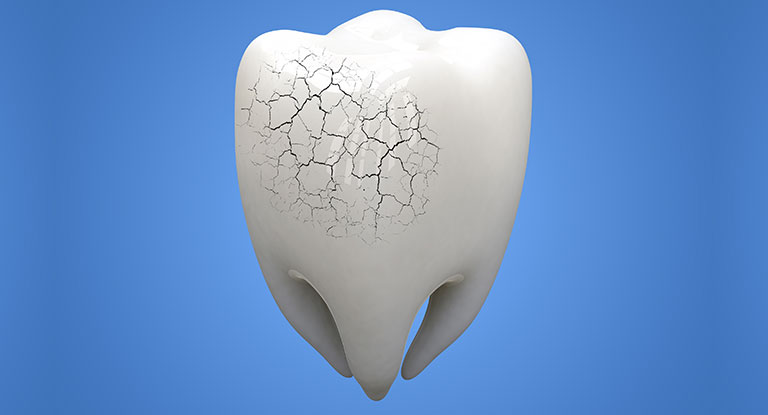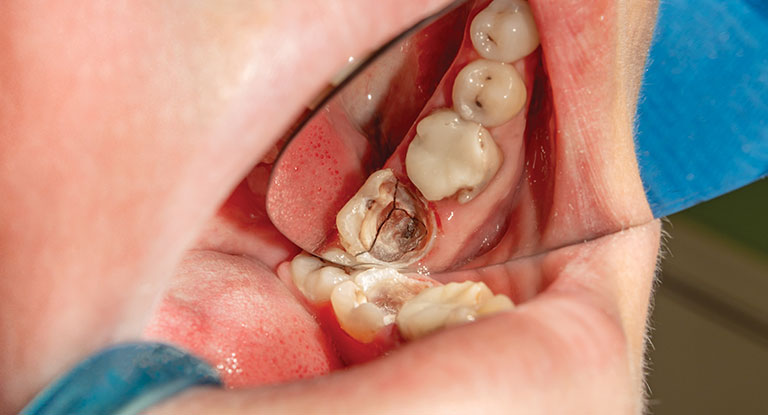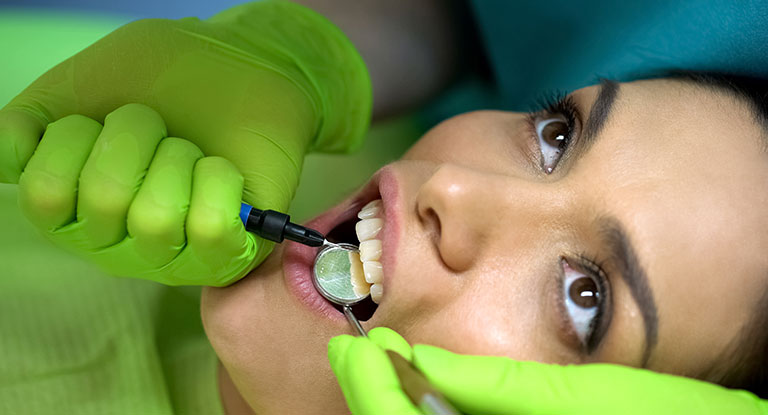

The enamel, which is the tough outer covering protecting your teeth is one of the strongest substances in the body. A chipped tooth has a rough, sharp, or disfigured surface. It has its limitations though, and excessive wear and tear or a forceful blow can make your teeth to chip.
This leads to a jagged tooth surface, which can be disfiguring, tender, and sharp.
There are many reasons teeth can chip, and the common causes are:

Weakened teeth are more prone to chipping than strong teeth; some factors that reduce the strength of a tooth are:
In general, a weakened tooth is at risk of chipped tooth. However, the second lower molar is more prone to chipping because of the pressure put on it while chewing.
Teeth with fillings are also prone to chipping and finally intact teeth are also prone to chipping.
You might not know you have chipped teeth if the chip is not at the front of the mouth and if it is minor, however, when you have symptoms, you will notice the following:
A dentist can diagnose chipped tooth by visibly inspecting your mouth. He/she will also ask you about your symptoms and events that might have caused the chipping.

The treatment for chipped tooth depends on the symptoms, severity, and location. It is not treated as a medical emergency if it is not causing you severe pain and interfering with your normal activities like eating and sleeping.
You have to make an appointment with your dentist as soon as possible to prevent further damage to the tooth. A dentist will treat a minor chip by smoothing and polishing the tooth.
For more severe and extensive chip, your doctor will recommend the following:
If your tooth breaks and you still have the fragment, keep it in a glass of milk to keep it moist, and the calcium present in the milk will still help to preserve it.
If you don’t have milk, tuck it into your gum and be careful not to swallow it. Go to a dentist immediately, and they can cement the fragment back onto your main tooth.
In this treatment method, a plastic material (composite resin) or porcelain (layers of ceramic) is plastered on the surface of your tooth and moulded to its form.
Ultraviolet lights are used to dry the materials and harden it. More shaping is done after drying until the material fits your tooth exactly.
This bonding can last up to ten years.
The dentist will smooth away some of your tooth enamel; this will make room for the veneer before it is attached. They will shave off less than a millimetre.
Then your dentist will make an impression of your tooth and send it to lab for the creation of the veneer. However, a temporary veneer will be used in the meantime until when the permanent veneer is ready.
When it is ready, the dentist will bond it to your tooth. This veneer can last up to 30 years because it is durable.
If only a part of your tooth is affected by the chip, the dentist will suggest a dental onlay. This is applied to the surface of the molars, and a full dental crown is recommended if the damage done to the tooth is significant.
Anaesthesia would be given to you so that the dentist can work on your teeth properly and give room for an onlay. In most cases, the dentist takes a mould of your tooth and sends it to a dental lab for the creation of the onlay.
Once the onlay is created, it would be fitted on your tooth and then cemented to make it strong. There is an advance in technology now, and some dentists can mill porcelain onlay right in their office and place them on your tooth in that same day.
These onlays can last for decades, but how long it lasts depends on a lot of factors like the type of foods you eat because this will create wear and tear on the onlay.
It also depends on what tooth was affected; the molars wear easily because lots of pressure is placed on them when chewing.

The cost of treating chipped tooth varies, and it depends on factors like the country you live in, the tooth involved, the extent of the damage or chip, and whether the pulp of the tooth is affected.
You will definitely need a dentist to treat your chipped teeth, but there are some things you can do to reduce the damage to the tooth until you see a doctor.
If the chip is extensive, it can affect the root of the tooth and infection can set in. A root canal is usually used to treat this condition.
Some symptoms of the infection are:
A chipped tooth is a very common dental injury, and it does not produce significant pain in most cases. A chipped tooth can be treated using a wide variety of dental procedures.
You have to get treatment immediately if you have a chipped tooth. Although it is not a dental emergency, early treatment will prevent infections and also prevent the case from getting worse.
You will recover faster when the dental procedure is complete.
At Smile Works Dental, we handle several kinds of dental problems including chipped teeth. If you have a chipped tooth or any other dental problem, reach out to us on 020 71834091 to book an appointment.